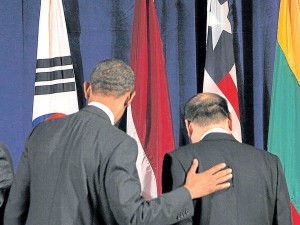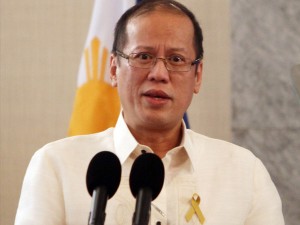Aquino stars in New York
NEW YORK—President Benigno Aquino III on Wednesday took center stage at a new multilateral initiative by eight countries aimed at ensuring transparency in government and the empowerment of citizens in fighting corruption.
Saying the Philippines “is not only excited [about] but also derives strength” from working together with other members of the new initiative, the President joined 45 other world leaders in launching the Open Government Partnership (OGP) at the Waldorf Astoria hotel.
The Philippines is one of the eight countries—and only one of two from Asia—that make up the OGP Steering Committee. The others are the United States, Brazil, Indonesia, South Africa, Norway, the United Kingdom and Mexico.
In a speech, the President expressed thanks “for honoring my country with membership in the OGP Steering Committee.”
“This acknowledges and further strengthens our commitment to promoting transparency, fostering accountability and combating corruption,” he said.
Mr. Aquino said the Philippines’ participation in the initiative was “consistent” with his administration’s “commitment to honest and effective governance.”
He told his audience that he won the presidency in 2010 because Filipinos wanted an open government, and that his administration was bent on achieving this fully with a road map.
The initiative was started in January when a small group of government and civil society leaders met to talk about transforming governance.
US President Barack Obama, who cochairs the OGP, had earlier invited Mr. Aquino to attend the launch, at which they sat beside each other.
According to Ambassador to the United States Jose Cuisia Jr., the Philippines was chosen to be among the founders of the initiative because of Mr. Aquino’s “commitment to good governance and his determination to fight corruption in order to create more jobs for Filipinos and eventually reduce poverty.”
Meaning of democracy
Mr. Aquino said that while Filipinos sought “open and accountable governance” in toppling the Marcos dictatorship in 1986, it was this same desire that moved them to elect him, “a member of the opposition,” to the presidency.
“This is what democracy is all about: having a government disciplined enough to imbibe in itself the principles of transparency, accountability and citizen involvement—the necessary preconditions to poverty alleviation and inclusive and sustainable economic growth,” he said.
The President also said that just as his administration would continue to wage a campaign “against those who abused power in the past, we are also strengthening institutions through open government.”
“In fact, we have created a road map called the 2012 Philippine Government Action Plan to ensure that our government institutions are at par with international transparency standards,” he said.
He added that the action plan was developed through consultations with civil society and business groups engaged in the integrity advocacy, and would be implemented in January 2012.
Good place for business
“All these efforts are indicators of how serious we are in transforming our system from one that operates through secrecy, impunity and collusion, into a government that embodies transparency, accountability, and citizen engagement—a government that truly exists for its people,” Mr. Aquino said.
In a speech Tuesday night before the Asia Society, the President said the Philippines’ being chosen to be part of the OGP affirmed that it was “a good place to do business in and a good country to do business with.”
In yet another speech at the OGP-related forum “The Power of Open Government: A Global Discussion” at the Google headquarters in New York, Aquino, who was the only head of state to speak there, underscored the importance of governments engaging their people and being open with and transparent to them, especially in the “age of flux” and advanced communication technologies.
Mr. Aquino said there was now “a profound reexamination of the relationship between governments and their citizens” as the world economic system was being “reordered” by the “Arab spring” or political turbulence in the Middle East and the economic turbulence in the United States and Europe.
“At the heart of this reexamination is a fundamental reality that governments throughout history have ignored at their peril: Governments exist at the sufferance of their people,” he said.
Social media
Mr. Aquino said that before communications technologies modernized, governments “could lull themselves into thinking that even if they lacked popular consent, they had the luxury of time to play deaf and dumb to their people’s needs.”
He noted how Filipinos were able to replace the Marcos dictatorship only after 14 years and how, with today’s advanced communications, a people’s struggle against a government could “happen much quicker.”
He also noted how social media could “expose corruption and other abuses, and arouse public opinion to mobilize and reclaim their government.”
“The ever-quickening pace of communications and ever-increasing opportunities for engaging in conversations across sectors and borders is both a boon and a bane,” Mr. Aquino said, pointing out that anyone with access to the Internet could now “reach millions of people and dispense pearls of wisdom, or perversely, misinform and mislead in pursuit of a selfish agenda.”
This is why, he said, governments should engage its citizens in dialogue so as to reinforce openness and make it less tempting for those in power to engage in crime.
“I believe it is incumbent on all of us to confidently assert that governments that do things right should have no problem keeping our fellow citizens informed
and engaged and, thus, partners of government in its fundamental task of addressing the needs of the people,” he said.
Chat with Obama

PAT ON THE BACK. US President Barack Obama puts his hand on the back of President Aquino after Tuesday’s launch of the Open Government Partnership initiative held at the Waldorf Astoria hotel. EDWIN BACASMAS
On the sidelines of the OGP launch, the President told reporters that Obama congratulated him for his achievements in his first year in office.
According to Mr. Aquino, Obama said he had learned that certain people whom the Aquino administration was going after were also resisting its efforts to bring them to justice.
Obama likewise said there were also certain people who were trying to push back his own reforms, Mr. Aquino said, adding:
“Certainly he has many problems, and I told him I wish him the best of luck in addressing all of these.”
Mr. Aquino said that he had invited the US leader to visit Manila, and that the latter said they could talk longer at the Asia-Pacific Economic Forum in Hawaii in November.
He added that Obama was also busy with the US presidential election next year.
Originally posted at 11:39 pm | Wednesday, September 21, 2011



















